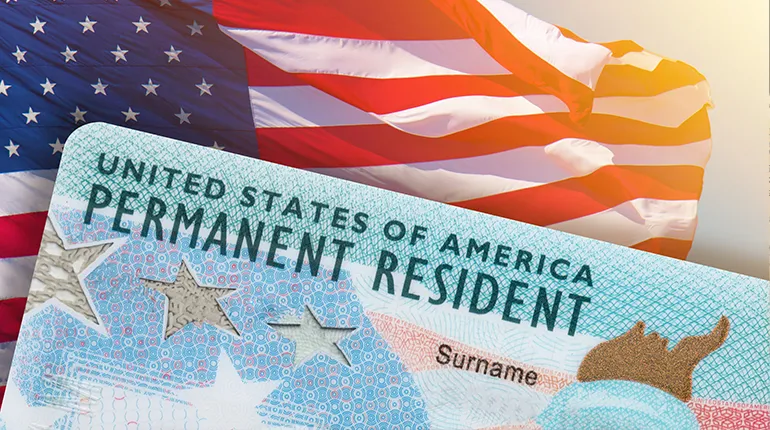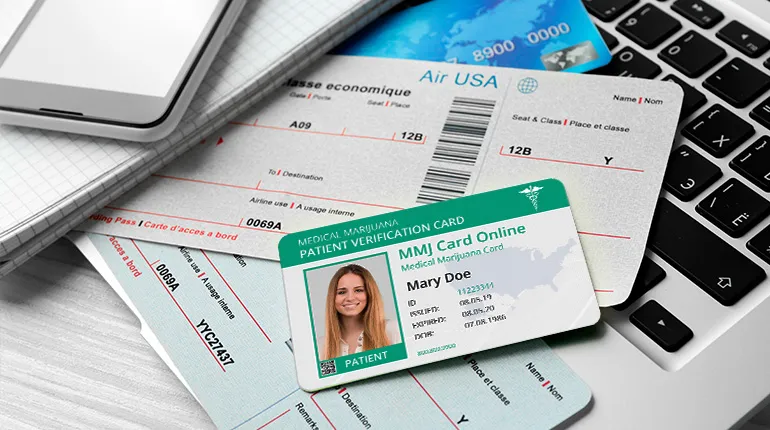Do You Have to be a United States Resident to Get an MMJ Card?

Interestingly, no requirement within state laws say you must be a United States citizen to get a medical marijuana card. Therefore, you have access to cannabis as long as you’re a resident of the state you’re applying for an MMJ card in.
In other words, non-U.S. citizens can apply for medical marijuana if they are state residents and have a physical address and state ID for the state they live in. For instance, if you legally reside in the U.S., live in Louisiana and want to apply for its MMJ program, you can do so if you have proof that you are a Louisiana state resident.
Green card holders (also known as lawful permanent residents, or LPRs) lacking a state ID card or a driver’s license can technically use their green cards to apply for medical marijuana.
However, whether you’re an LPR or have yet to attain your green card, using MMJ could have serious consequences if you’re not an American citizen. This article explores the problems faced by non-American citizens who use medical marijuana, and what could happen if they are caught.
Can I Be Deported from the United States for Using MMJ?
Yes. Even if you live in a state that has a legal medical marijuana program, and you are allowed to use cannabis legally with an MMJ card, marijuana is still a Schedule I controlled substance, which means it is federally illegal. Ultimately, federal law determines your immigration status. Therefore, if you use marijuana, the federal government could convict you of a crime and depart you.
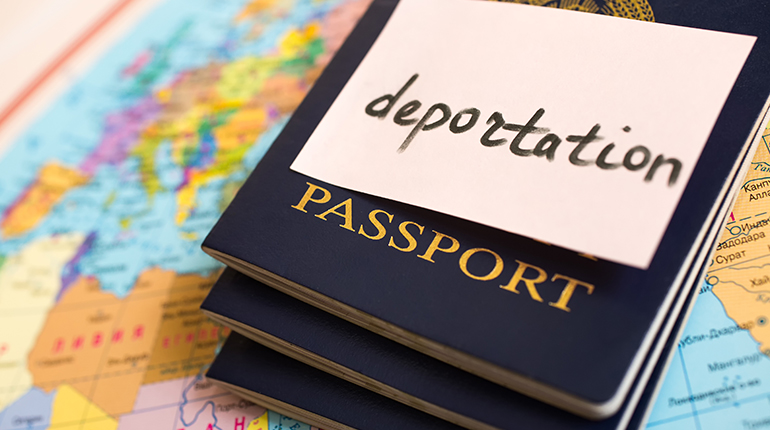
Even green card holders convicted of federal law violations can be deported. Thus, your status as a resident is in jeopardy if you’re found using medical marijuana. You may escape this fate if it is your first offense and you’re in possession of 30 grams or less. However, if caught with over an ounce, or if it’s your second offense, the government could kick you out of the country.
Furthermore, federal law states that you can be deported if classified as an “addict” or a “drug abuser.” The American government could easily suggest that using MMJ means abusing an illegal drug, or having an addiction to it.
What If I’m an LPR Temporarily Leaving the United States?
As a green card holder with a medical marijuana card, you could face serious issues if you leave the U.S. briefly then try to return. Suppose you have planned a vacation overseas for a couple of weeks. When you return, the United States Customs and Border Protection (CBP) officer could deem you an “arriving alien.” In this scenario, you must be “admissible” to America if you want to get back in.
If you have been convicted of a federal crime relating to marijuana, you are classified as “inadmissible.” Even if you’ve never been convicted of a weed crime, you could become “inadmissible” by admitting to the customs officer that you have used marijuana, or if they see your MMJ ID card. (Obviously, this is NOT a suggestion to lie to any customs authority on any question they may ask you).
That’s Not All, Folks!
The law goes even deeper here. Let’s say you work as a budtender in an MMJ dispensary, or you are employed with a legal marijuana grower. According to the U.S. government, you are a marijuana dealer or trafficker. Yet again, this means you’re “guilty” of a marijuana crime, so you won’t be allowed back into the country.
Indeed, according to the Controlled Substances Act (CSA), signed into law in 1970, knowingly being involved in the trafficking of a controlled substance is a federal crime. In a nutshell, you can’t buy, sell, give away, cultivate, use, possess, import, or export marijuana.
If that isn’t enough, you could also put your family in dire straits. The spouse and children of a controlled substance trafficker become inadmissible to the USA for five years if they benefit financially from this illegal activity.
To make matters worse, the 30-gram exception doesn’t apply to inadmissibility. If an LPR is convicted of a marijuana-related crime and leaves the country, the decision to render that person inadmissible is based on their past conviction. If you somehow get through customs, and they later uncover their mistake, they will track you down.
I Want to Use Marijuana; What Should I Do?
Perhaps you have severe pain or crippling anxiety that only medical marijuana can help. In that case, you might believe using it is worth the risk. If you’re in this situation, there is one thing you can do to reduce your risk of deportation or legal difficulties.
(Before we begin this section, please note that the following does NOT constitute legal advice. MMJCardOnline takes no responsibility for anyone who uses medical marijuana and later gets into trouble with the federal government).
The simplest option is to visit a state where recreational marijuana is legal. If feasible, perhaps you could even move there one day. You don’t need to apply for an MMJ card in a state with adult-use weed. Therefore, you don’t have to navigate any obstacles when proving state residency.
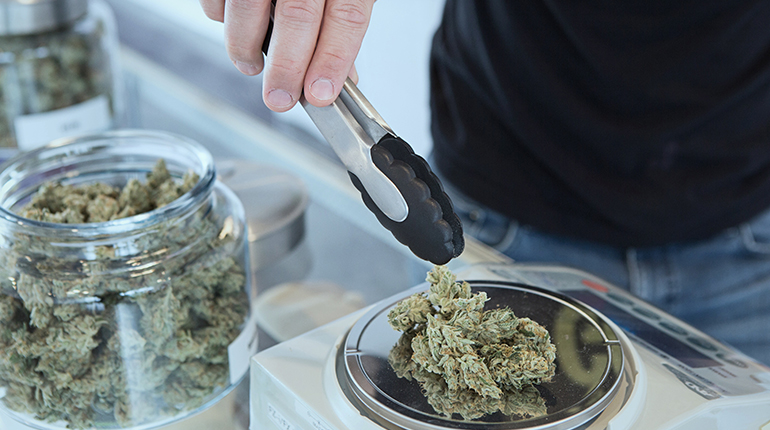
However, if you decide to visit a state that allows recreational marijuana, make sure you only use cannabis in that state. It is a federal crime to bring weed across state lines, and if caught, there’s a real chance of deportation.
Also, if you leave the United States and return, admitting that you use recreational marijuana is potentially enough to ensure you don’t get back in.
A Warning
United States Citizenship and Immigration Services (USCIS) and CBP officers have been accused of trying to entrap immigrants. This allegedly happens in Washington state, among other places. The officers question immigrants about whether they used or possessed marijuana in the five years before their citizenship applications. If the applicant admits to using the substance, they must sign “marijuana affidavits.” By doing so, the applicant is prohibited from becoming a permanent resident or citizen for five years.
Indeed, the American Civil Liberties Union (ACLU) has warned immigrants living within 100 miles of the national border to be extra careful. CBP agents in these regions are more likely to enforce federal drug laws. You could be prosecuted for using or transporting the substance, and CBP agents are permitted to search cars without a warrant.
There are also circumstances that can trip up people applying for visas. In advance of your visa appointment, you must attend a medical exam. Many applicants believe that whatever they discuss with the doctor remains confidential. In reality, all statements made during the examination can be shared with immigration officials as part of the visa interview process.
What If I Have an MMJ Card and Want to Buy Cannabis in Another State?
It all depends on whether the state you’re visiting has a reciprocity program. In such locations, you can buy medical marijuana with your out-of-state MMJ card. First, it is worth discovering whether the place you’re traveling to allows recreational marijuana. If it does, you can buy up to an ounce (in most areas) if aged 21+ without providing evidence of an MMJ card or state residency.
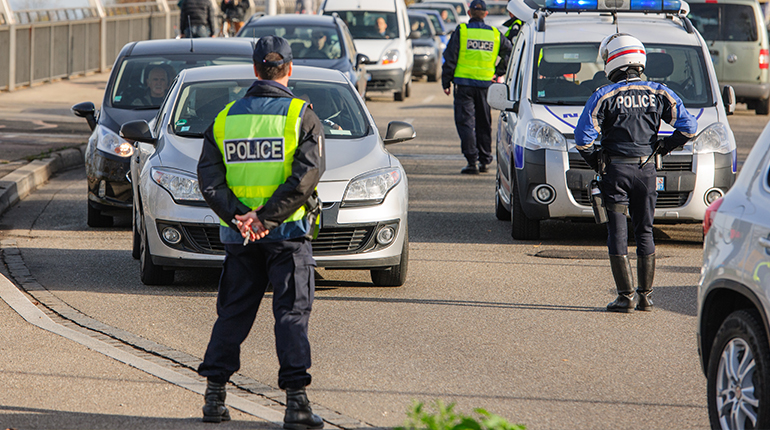
At the time of writing, at least a dozen states with medical marijuana programs accept out-of-state MMJ cards. Please note that the laws can vary from one state to the next. Therefore, it is important to check the rules of the state you intend to visit. Otherwise, you could inadvertently break the law.
Regardless of whether a state has reciprocity, it is a federal offense to bring marijuana from one state to another. Therefore, you should never cross a state border in possession of weed.
Final Thoughts on Medical Marijuana, State Residency, and Immigration Laws
Ultimately, most immigration attorneys advise non-citizens to stay away from marijuana until they become American citizens. Otherwise, even using MMJ legally in a state could prevent them from becoming full citizens.
If you have any connection with the marijuana industry, contact a lawyer before traveling outside the United States, talking to an immigration officer, or completing any applications with the government.
Also, it is wise not to leave your house carrying marijuana or an MMJ card when possible. You may even want to avoid mentioning the substance on social media, or talking about it on your phone. Yes, this may seem extreme, but ultimately, when the price you pay could involve deportation from the United States, it is best to be safe rather than sorry.
While you can apply for medical marijuana with your green card, you have to decide on your own whether or not it is worth the risk.
